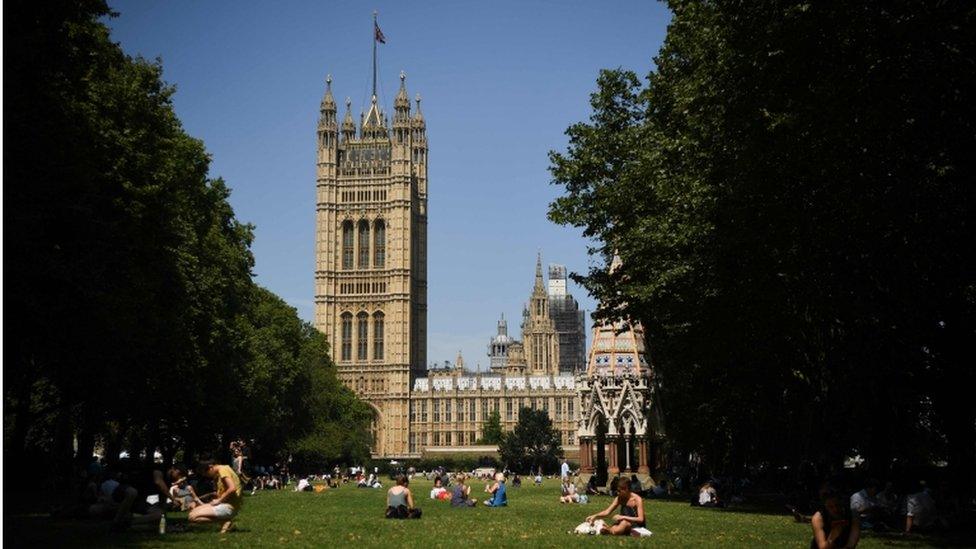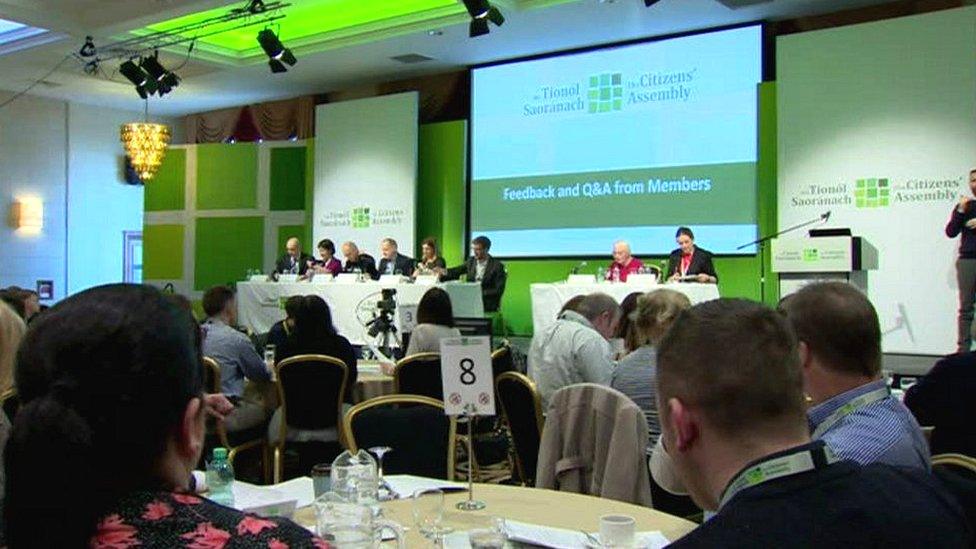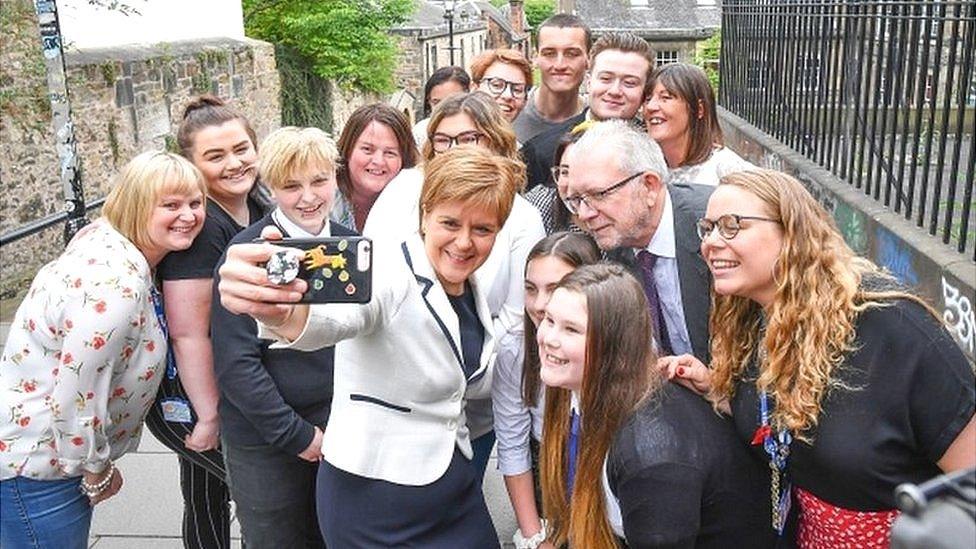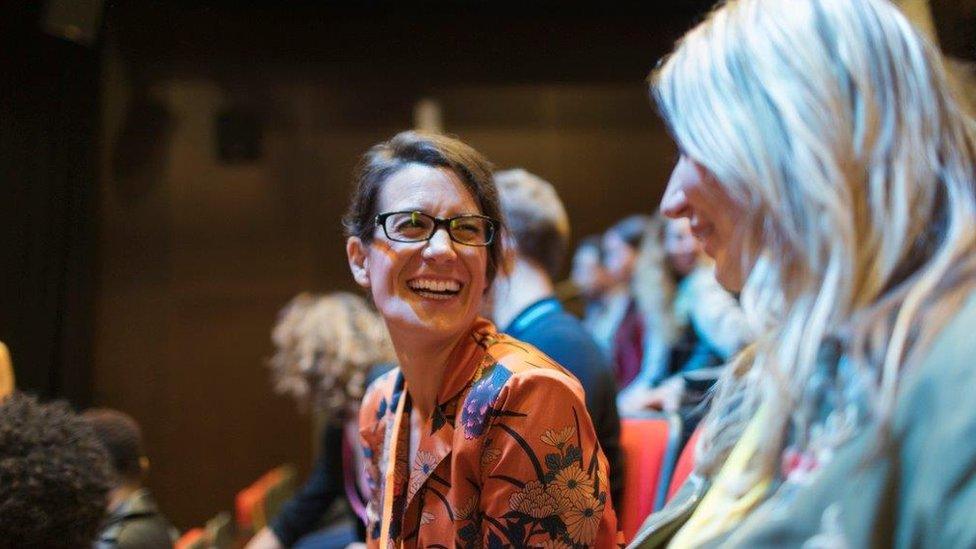Could you help shape the future of UK democracy?
- Published

Next year, you could receive a letter through the door inviting you to take part in an exercise aimed at healing the rift between citizens and their elected representatives.
A recent poll by the Hansard Society found that 63% of people feel the UK's system of government is rigged to the advantage of the rich and powerful.
And 47% of those questioned believed they had no influence at all over national decision-making.
In an attempt to remedy this, the Citizens' Convention on UK Democracy is preparing to launch a two-year nationwide exercise, asking the public to come up with ideas to change how UK politics works.
Members of the public will be invited to consider ideas such as how politics is financed, how we vote for our politicians, House of Lords reform and English devolution.
The project hopes that, at the end of the process, political parties will promise to take on the convention's recommendations.
What is the plan?
The aim is to launch the two-year "citizens' convention" on 1 January 2020.
The convention would consist of four parts:
A mass communications exercise to spark conversation about the UK's democracy
A "prioritisation convention" to narrow down which challenges should be considered
"Thematic assemblies" to explore the challenges in depth and produce solutions
A "UK summit" to agree the recommendations
The final recommendations would be set out in a report by January 2022. Those behind the convention then hope to persuade party leaders to include a promise to treat the proposals "seriously" in their manifestos ahead of a general election.
Graham Allen - a former Labour MP, and one of the driving forces behind the project - says politicians would not want to ignore the proposals, if there was enough public support for the ideas.
What will be discussed?
Participants will discuss constitutional issues rather than ideas for individual policies.
As the convention guide states, people "will be talking about the rules of the game, not its results".
The citizens' convention report says the final agenda should be defined during the convention itself, but the MPs have put forward various topics as suggestions.
However, the issue of Brexit is specifically excluded.
The report says the issue of Britain's relationship with the European Union, "risks diverting much of the energy of the convention into a live and intensely divisive question".
Who can get involved?
The consultation document says recruitment should begin after a nine-month media blitz and engagement exercise to raise awareness. This potentially could be modelled on the series of nationwide debates launched by President Macron, in response to the yellow vest protesters in France.
After this, letters will be sent to approximately 10,000 households inviting them to get involved with defining the agenda.
Of those who respond positively, 100 volunteers will be selected, with participants weighted by criteria such as age, ethnicity, gender, region and socio-economic group.
A similar recruitment round will also be held for the smaller groups to discuss reform ideas, to be considered at the "summit" at the end of 2021.
The document suggests the groups could be weighted by their political opinions or party membership - but leaves this question open.

A citizens' assembly for Ireland was set up in 2016 to consider topics including abortion and climate change
Mr Allen said it was "essential" that those selected "represent a microcosm of the UK".
"It is incumbent on us to make sure people get access to the process - that means people who are not online, people who may have a disability or people who have a low income," he added.
The former MP also said the process needs to be "funded properly" in order to ensure full representation - for example, by covering the costs of transport costs or childcare.
Has this been tried before?
There are examples of countries using "deliberative democracy" to solve thorny issues.
In 2016, a citizens' assembly was set up in Ireland to examine topics including abortion and climate change. In 2017, following 10 days of debate, the assembly voted to recommended the introduction of unrestricted access to abortion.
In Japan, a group called Future Design, conducts citizens' assemblies at which participants imagine themselves to be future residents from the year 2060.
Scottish First Minister Nicola Sturgeon has said she wants to set up a citizens' assembly to consider the constitutional questions facing Scotland. However, the Scottish Conservatives said it would be "nothing but a talking shop for independence".
In Wales, 60 members of the public have been selected to consider the question "how can people in Wales shape their future?" through the work of the Welsh Assembly. UKIP called the initiative "unnecessary" and an admission of failure by the assembly.
Prof James Fishkin, of Stanford University's Centre for Deliberative Democracy, has run several "deliberative polling" experiments, whereby a randomly selected group discuss a particular issue - with input from politicians and experts.
The centre says the experiments have produced "dramatic, statistically significant changes in views" and has even contributed to changes in policy.
"Deliberative polling has brought wind power to Texas and sparked desegregation of Roma-only schools in Bulgaria," says Prof Fishkin.
"We have some real problems with our democracy, where social media allows us just to speak to the like-minded," he says.
He argues that deliberative democracy, by facilitating meaningful public discussion, "fills a gap in between the sometimes angry voices of populism on the one side and the distrusted views of the political elites on the other".
'Democracy is fighting back'
Mr Allen - who is governing preparation for the project - says: "Our democracy is under tremendous stress and pressure.
"I think what we can demonstrate in the UK - and from what we've seen in other democracies - is that democracy is fighting back.
"We are waking up and saying we do need to evolve our democracy because there are people out there who are trying to undermine it - President Putin is one."
The Russian president recently said that liberalism, the ideology underpinning Western democracies was "obsolete", while Hungary's Prime Minister Viktor Orban has said he believes authoritarian systems, like those in China and Russia, work better than Western liberal democracies.
Who is backing the scheme?
The proposals grew out of a project at King's College London and will now go out for consultation until the end of August.
Those backing the scheme include Labour's deputy leader Tom Watson, ex-Lib Dem leader Sir Vince Cable, former Brexit Secretary David Davis, former Attorney General Dominic Grieve, and Green Party MP Caroline Lucas.
- Published20 June 2019

- Published26 June 2019

- Published7 July 2019
